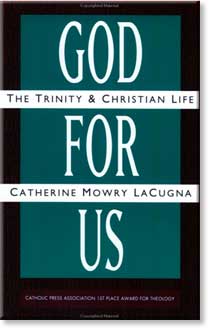 In my Introduction to Systematic Theology class I often have students research one of the “great” theologians or engage a classical theological text. I am usually troubled that my selection is entirely male, although thankfully, that is now beginning to change with some outstanding female theologians emerging. The reason for the selection is simply that the history of Christian thought has, until recent decades, been largely a male story. This year, however, I decided I had to change this imbalance and so included a reading by Catherine Mowry LaCugna alongside those by Athanasius, Luther and Barth. I suspect that LaCugna’s God For Us will not actually be viewed in the future as a “classic,” although it was a celebrated volume when it was published in the early 1990s and still commands much respect today. The feminist Catholic theologian died prematurely in May 1997, at only forty-four years of age.
In my Introduction to Systematic Theology class I often have students research one of the “great” theologians or engage a classical theological text. I am usually troubled that my selection is entirely male, although thankfully, that is now beginning to change with some outstanding female theologians emerging. The reason for the selection is simply that the history of Christian thought has, until recent decades, been largely a male story. This year, however, I decided I had to change this imbalance and so included a reading by Catherine Mowry LaCugna alongside those by Athanasius, Luther and Barth. I suspect that LaCugna’s God For Us will not actually be viewed in the future as a “classic,” although it was a celebrated volume when it was published in the early 1990s and still commands much respect today. The feminist Catholic theologian died prematurely in May 1997, at only forty-four years of age.
In our seminar we focussed on LaCagna’s final chapter, “The Practical Trinity.” LaCugna writes beautifully and passionately and has an amazing vision of “the household of God” understood through the lens of Jesus’ life and teaching.
The form of God’s life in the economy dictates both the shape of our experience of that life and our reflection on that experience. Led by the Spirit more deeply into the life of Christ, we see the unveiled face of the living God. God’s glory is beheld in Jesus Christ who is the instrument of our election, our adoption as daughters and sons of God, our redemption through his blood, the forgiveness of our sins, and the cause of our everlasting inheritance of glory (Ephesians). In order to formulate an ethics that is authentically Christian, an ecclesiology and sacramental theology that are christological and pneumatological, a spirituality that is not generic but is shaped by the Spirit of God, Spirit of Christ, we must adhere to the form of God’s self-revelation, God’s concrete existence as Christ and Spirit. The purpose of the discipline of theology is to contemplate and serve that economy, to throw light on it if possible, so that we may behold the glory of God, doxa theou, ever more acutely.[1]
For LaCugna, the doctrine of the trinity is a way of contemplating the mystery of God and of ourselves, a heuristic framework for correct thought about God and ourselves in relation to God.[2] All correct thought about God begins here, with what God has actually done in the economy of salvation in Christ and through the Spirit. Here we may know the God who comes to us.
At the heart of all reality, including the household of God, is the personal God whose being  is communion, the God who exists toward and for another. The reign of God, the household of God exists where this form of life—exemplified by Jesus—is evident and practised. Jesus is both the exemplar and the criterion of the reign of God, both in his life and in his teaching. According to LaCugna, Christian orthopraxis must correspond to what we believe to be true about God, and what is true about God is known via his activity in the economy of salvation.[3]
is communion, the God who exists toward and for another. The reign of God, the household of God exists where this form of life—exemplified by Jesus—is evident and practised. Jesus is both the exemplar and the criterion of the reign of God, both in his life and in his teaching. According to LaCugna, Christian orthopraxis must correspond to what we believe to be true about God, and what is true about God is known via his activity in the economy of salvation.[3]
The divine archē, the divine origin and rule, is of great concern for LaCugna, who insists that the “monarchy” of God refers to the trinity rather than simply to the Father alone. God’s monarchy is “relational, personal and shared,” a rule of “personhood, love and communion.”[4] LaCugna resists the substantialist ontologies that have often characterised Christian reflection on the being of God. God is not a divine “substance,” but three persons. She argues that the Cappadocians understood the trinity such that “hypostasis (person) was predicated as prior to and constitutive of ousia (nature).”[5] This establishes the ontological priority of personhood over nature, and so provides the ontological ground of relation and communion.
LaCugna suggests that the doctrine of the trinity elaborated by the Cappadocians “dared the Christian imagination” to think of God differently, and so to relinquish all forms of domination and hierarchy.[6] This, perhaps, takes us to the very heart of LaCugna’s project: to stir and renew the Christian imagination in ways shaped by the triune God as revealed in the economy of salvation. That is, to imagine a church and a society grounded in values of communion, inclusion, relationship, personhood, equality, mutuality and generous self-giving service. “This is the lofty vocation of the members of the church of Jesus Christ, to be stewards (oikonomoi) of God’s economy, to serve others (diakonia), to preach the message of the reign of God (kerygma), to promote communion (koinonia).”[7]
Living trinitarian faith means living God’s life: living from and for God, from and for others. Living trinitarian faith means living as Jesus Christ lived, in persona Christi: preaching the gospel; relying totally on God; offering healing and reconciliation; rejecting laws, customs, conventions that place persons beneath rules; resisting temptation; praying constantly; eating with modern-day lepers and other outcasts; embracing the enemy and the sinner; dying for the sake of the gospel if it is God’s will. Living trinitarian faith means living according to the power and presence of the Holy Spirit: training the eyes of the heart on God’s face and name proclaimed before us in the economy; responding to God in faith, hope and love; eventually becoming unrestrictedly united with God. Living trinitarian faith means living together in harmony and communion with every other creature in the common household of God, “doing all things to the praise and glory of God.” Living trinitarian faith means adhering to the gospel of liberation from sin and fractured relationship: liberation from everything that misleads us into false worship, from everything that promotes unnatural, nonrelational personhood, from everything that displaces us to an exclusive household, from everything that deceives us into believing self-aggrandizing archisms.[8]
Why do I suspect that LaCugna’s work will not become a “classic”? Although I affirm her approach to the trinity in general terms, and appreciate her insights into the implications of trinitarian doctrine for practical Christian faith and life, I find that I cannot follow her in collapsing the immanent trinity into the economic trinity. I prefer to follow Barth here, and the tradition more generally, than Rahner or Moltmann. It is certainly the case that we know the immanent trinity only by means of God’s self-revelation in the economy, and that what we know of God via the divine self-revelation is true and faithful knowledge. Nevertheless, God is more than has been revealed though not other than what has been revealed. Further, if I understand LaCugna correctly—and I grant the point that I may not—her construal of the trinity makes God dependent on the creation for God’s own being and is thus a panentheistic doctrine of God that compromises both the divine sovereignty and the grace of creation and redemption. The tradition does not make this leap, and I suspect that future orthodoxy will not either. God, fully God within the divine triune being prior to and without the creature, turned toward that which is not God in creation and redemption graciously welcoming and including the creature in the divine life. Barth’s insistence on the immanent trinity retains this emphasis.
[1] LaCugna, God for Us, 378.
[2] Ibid., 379.
[3] Ibid., 383.
[4] Ibid., 390, 91.
[5] Ibid., 389.
[6] Ibid.
[7] Ibid., 401.
[8] Ibid., 400-01.
On today the anniversary of her death I found your article.
While much is really well written, you are wrong in your conclusion.
I knew her personally, was her student and I can assure you that
She was most definitely not a panentheist. Calling her so
is by far too reductionistic. She worked hard in nuancing her language to keep from this
Label and valued historical scholarship too much to veer off course that much
She did meticulous research of early, sometimes lesser known, tradional thought and used her poetic imagination to weave a coherent language of beauty
She is worth a deeper read than you give her
Hello Jacquee,
Thank you for your comment and the clarification/correction you offer: I am glad I qualified my remark as I did! I will look again at what she wrote and how she structured the God-world relation. It will do me good to read her again, and the whole work more closely.
And thank you for the heads-up of Catherine’s anniversary: I would not have known that off-the-cuff. For you to remember after so many years speaks of how dear she was to you.
Grace & peace, Michael.
Virus – isolated in a garden I read Catherine’s God for Us prompted by R Rohr’s recommendation in his book The Divine Dance. I cried when I read of her early death. Bit selfish! She soars with the everflowing Love Divine. I am convinced she might espouse panentheism. Even as I am not my garden but “in” every bit of it. I read her book with ever increasing love and great joy! Peace. An 80 year old Catholic priest – now on the alternative ministry of marriage. Alternative sadly!